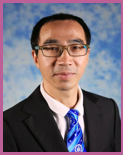Macau University of Science and Technology, China
Prof. Shuai Cheng Li
City University of Hong Kong, China

Bio: Dr. Shuai Cheng Li is a Professor in the Department of Computer Science at City University of Hong Kong, where he has served since 2011. He earned his BSc and MSc from the National University of Singapore (NUS), his PhD from the University of Waterloo, and completed a postdoctoral fellowship at UC Berkeley under an NSERC award (2009-2011).Li leads the ongoing development of platforms such as DeepOmics.org (a cloud-based omics analysis platform for cancer studies with over 200TB of data and tools like Oviz-Bio, MIRIA, and TIMEDB) and Oviz.org (a web-based tool for interactive cancer genomics visualization). His research focuses on developing algorithms and computational tools to analyze large-scale genomic and proteomic data, aiming to uncover mechanisms in complex biological processes. Key directions include genome assembly, biochip design, vaccine design, T-cell receptors, and cancer data analysis, with a current emphasis on AI-assisted drug design. He has authored over 190 SCI papers with recent works in Nature Machine Intelligence, Nature Communications, Nucleic Acids Research, and others. His tools are available on GitHub under deepomicslab.
Prof. Qinglin Zhao

Bio: Prof. Qinglin Zhao, IEEE Senior Member and China CCF Member, is a Professor with the School of Computer Science and Engineering (SCSE) at the Macau University of Science and Technology (MUST), Macau. He received his Ph.D. degree from the Institute of Computing Technology, Chinese Academy of Sciences, Beijing, China in 2005. Following his doctoral studies, he worked as a Postdoctoral Researcher with The Chinese University of Hong Kong and the Hong Kong University of Science and Technology from May 2005 to August 2009, before joining SCSE, MUST in September 2009. His research interests encompass machine learning, blockchain and Web 3.0, Internet of Things, wireless communications and networking, edge computing, and quantum machine learning. Prof. Zhao has published more than 100 peer-reviewed papers, including 30 IEEE Transactions papers, and holds more than 30 patents, including 8 U.S. patents. He received the BOC Excellent Research Award from Macau University of Science and Technology in both 2011 and 2015. Currently, he serves as an Associate Editor for IEEE Transactions on Mobile Computing and IET Communications, General Chair of the 34th IEEE Wireless and Optical Communications Conference (WOCC 2025), and as an expert review committee member for the Guangdong Science and Technology Award.
Prof. Shaolin Liao
Sun Yat-sen University, China

Bio: Professor Liao Shaolin is a high-level talent recognized by the Organization Department of the CPC Central Committee, the leader of the Guangdong Pearl River Innovation and Entrepreneurship Team, a leading talent of the Guangdong Pearl River Talent Plan, and a leading talent under the Sun Yat-sen University Hundred Talents Program. Prof. Liao is a PhD supervisor at the School of Electronics and Information Engineering (School of Microelectronics), Sun Yat-sen University. Prof. Liao also serves as an adjunct professor at the Illinois Institute of Technology (IIT), Chicago, USA. In addition, he is also a visiting professor at Purdue University, USA, collaborating under the mentorship of Professor Weng Cho Chew, a member of the U.S. National Academy of Engineering and IEEE Fellow. Nowadays, Prof. Liao currently holds editorial board positions in several prominent international journals, including: (1) Associate Editor of the Chinese Academy of Sciences top-tier journal IEEE Internet of Things Journal, which currently has an impact factor of 8.9 (classified under CAS “Computer: Information Systems” and “Telecommunications” categories and JCR Q1); (2) Guest Editor of special issues for IEEE Selected Areas in Sensors; (3) Guest Editor of special issues for IET Microwave Antennas and Propagation. Prof. Liao earned his Bachelor's degree in Materials Science and Engineering from Tsinghua University and his PhD in Electrical and Computer Engineering from the University of Wisconsin–Madison (UW-Madison). He also obtained dual Master’s degrees in Materials Science and Electrical Engineering from UW-Madison. He completed two postdoctoral fellowships focusing on interdisciplinary research at the City University of New York (CUNY) Physics Department and the Engineering Physics Division of Argonne National Laboratory (ANL), the first national laboratory under the U.S. Department of Energy. In November 2009, Prof. Liao was promoted to Adjunct Assistant Professor at CUNY, and in November 2013, he was promoted to a tenured Electronics Engineer position at ANL. In February 2019, he was appointed as Professor in the Department of Electrical and Computer Engineering at IIT. In 2021, Professor Liao joined the School of Electronics and Information Engineering (School of Microelectronics) at Sun Yat-sen University and was appointed as a Visiting Professor at the School of Electrical and Computer Engineering at Purdue University starting in 2024. His research team leverages top-tier national platforms including the National First-Class Discipline of Electronics and Information Science and Technology at Sun Yat-sen University, the National Supercomputer Center in Guangzhou, and the State Key Laboratory of Optoelectronic Materials and Technologies to conduct innovative interdisciplinary research integrating AI, electromagnetic waves, and photonics. Their main research focuses are next-generation artificial intelligence technologies, electromagnetics, optoelectronics, multiphysics scientific computation, communication, and sensing.

